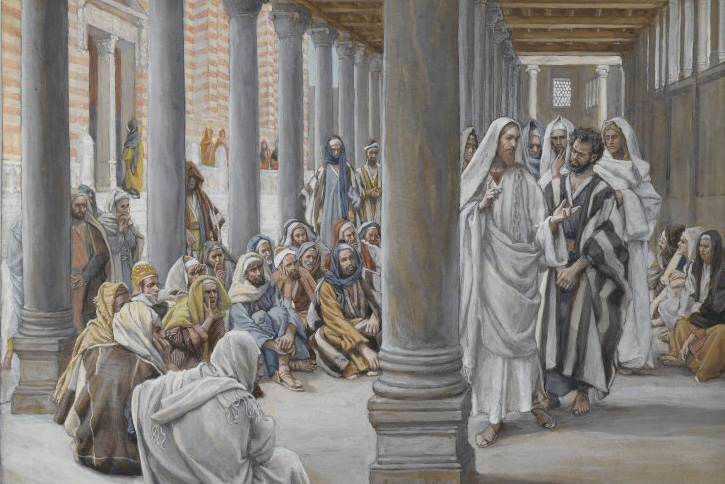Twenty-Ninth Sunday in Ordinary Time
First Reading: Isaiah 45:1, 4-6
Second Reading: 1 Thessalonians 1:1-5
Gospel: Matthew 22: 15-22
In the Gospel today Jesus is in Jerusalem for His passion and the tension between Him and the Pharisees have reached a fever pitch. The chief antagonist of Jesus in the Gospel of Saint Matthew are the Pharisees and there is no going back in entrapping Jesus. They sent their disciples with the Herodians to set a trap for Jesus. This is a very odd mix. The Pharisees and the Herodians do not agree. The Pharisees are the Zealots vehemently opposed to any foreign power, the Roman tax, the Roman occupation of Jerusalem and Israel. But unlike the Zealots, they do not believe in the use of violence to achieve their liberation from foreign domination. The Herodians are ardent supporters of the Romans and of the Herodian dynasty and so benefit from the taxes. That the Pharisees are ready to align with the Herodians to entrap Jesus shows that Jesus was for them more dangerous.
It is interesting to notice the strategy they use. First, they flatter Jesus to awaken His ego and so cloud His thinking. They said to Him, “Master, we know that you are a truthful man and that you teach the way of God in accordance with the truth.” Although what they said is true, they did not mean or believe it, they only wanted to pretend to believe Him and appear respectful before unleashing their trap. Nobody can trap Jesus. It is not a good idea to try to trap Him because the trap will always spring back to your own face. And that is what is going to happen in this instance.
Jesus is indeed in a precarious situation. He is caught up in a religious-state dispute over the issue of paying taxes to Caesar. They expect Him to make a statement they could use against him. If Jesus answered that it was lawful to pay taxes to a pagan ruler, then he would lose credibility with the Jewish populace who would regard him as a sinner, a coward and a friend of Caesar. If he said it was not lawful, then the Herodians would have grounds to report him to the Roman authorities as a political trouble-maker.
Jesus avoided their trap by confronting them with the image of a coin. Coin in the ancient world had significant political power. Emperors issued coins with their image and inscription on them. In a certain sense, the coin was regarded as the personal property of the ruler. Where the coin was valid, the ruler held political sway over the people. Jesus said, ‘show me the coin for the tax. Coins from the time of Jesus that have survived today bear the image of Caesar Tiberius with his profile. You can find them on the internet. The inscription on it reads, “Caesar Augustus Tiberius, son of the divine Augustus.
In the first century AD, two emperors that preceded him, Julius Caesar and Caesar Augustus, were elevated by the Romans to the status of gods.
Since the Jews used the Roman currency, Jesus explained that what belonged to Caesar must be given to Caesar. So, they brought Jesus a coin which not only has the image of the emperor but which says he is the son of god because his father is god.

Looking at the coin, Jesus asked them, “whose likeness, whose inscription?” They responded, Caesar’s. Jesus said to them, “render unto Caesar what belongs to Caesar and to God what belongs to God. Although we understand the response of Jesus to be a permission to pay taxes and be dutiful to the state, there is a deeper message Jesus is communicating. By using the words ‘likeness and inscription’ in asking them the question, Jesus is alluding to an Old Testament passage; Genesis 1: 26-27 which says that God made man and woman in His own image and likeness. This is extremely powerful and is intended to turn the trap around. The Pharisees and indeed His first century audience would have known that God made man in His own image and likeness and what it means. Just as the coin has the image of Caesar, both the Pharisees, the Herodians, Caesar himself and all of us bear the image and likeness of God since we are created in His image and likeness. You can give your money to Caesar, but you belong to God and must give your life to God.
Do you give to God what belongs to Him? Do you give Him the worship that is His due? Both the coin and the one whose head is on the coin belong to Him. everything we have that is good comes from God, both in the other of grace and in the order of nature Our belongingness to God has been reinforced by the truth that we have been redeemed by the precious blood of His Son, Jesus Christ Our Lord. We owe Him our whole life, our love and everything.
Happy Sunday

Fr Chidi Onwuka MSSCC
